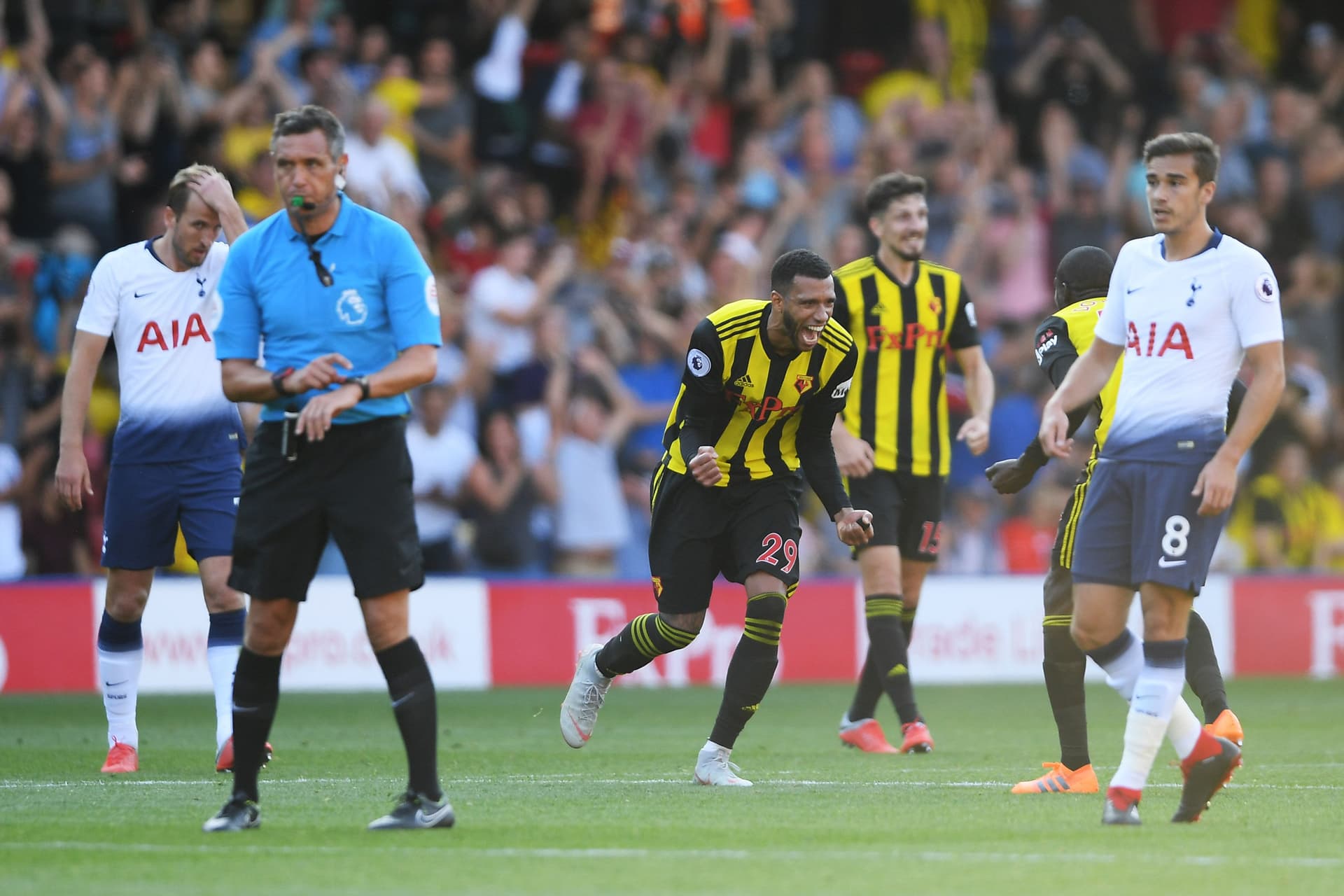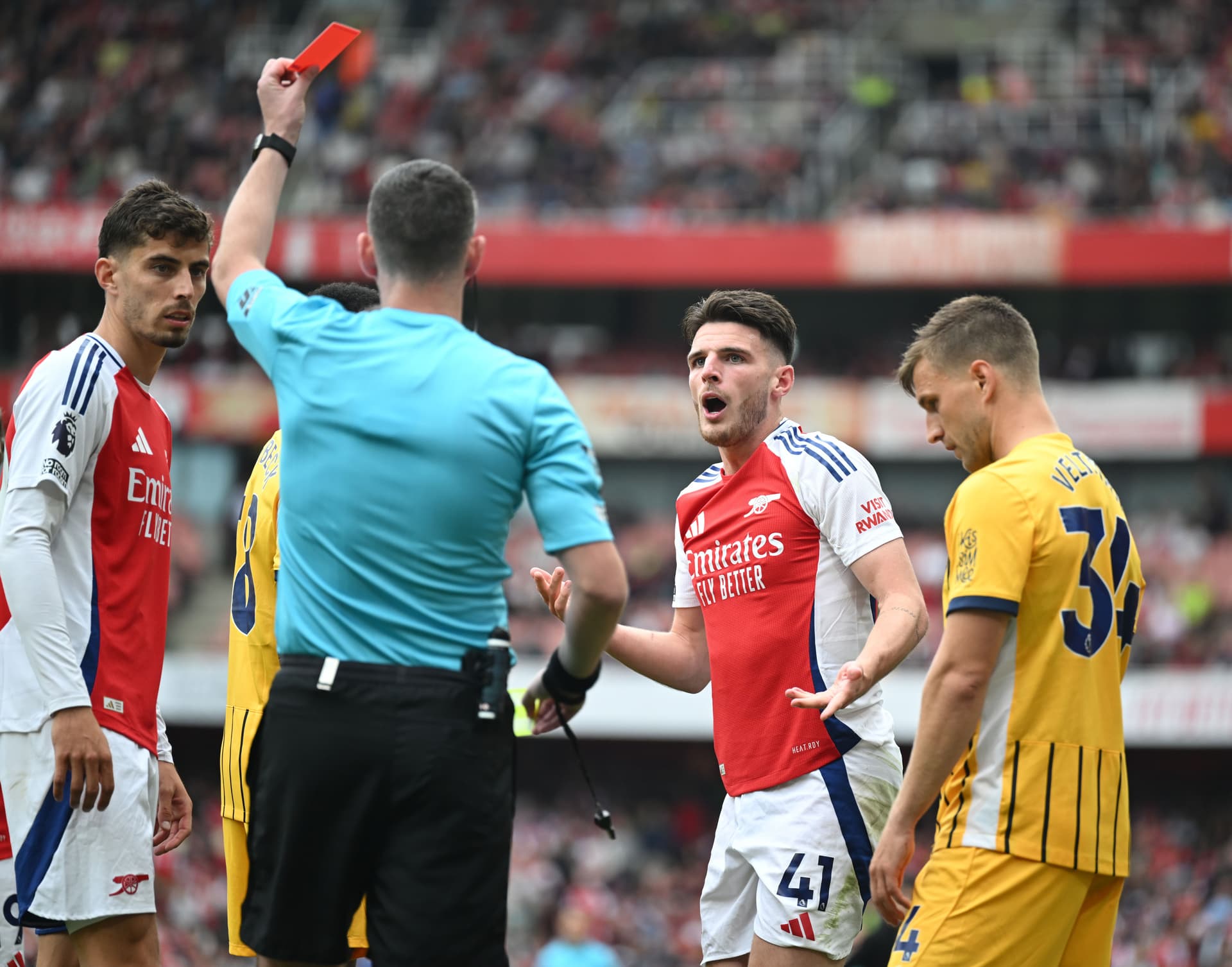Football
What Equipment Does a Referee Need in Football? Complete List
Football players need a range of equipment and kit to play the sport. But what equipment does a referee need in football? Find out here!

Image Credits: Mike Hewitt/Getty Images
Football players’ equipment is well known. Footballers need boots, shin pads, and their kit (tracksuit, shirt, shorts, socks, warm-up kit).
Some players with long hair use bands or clips to keep their flowing locks in check. Many players sport tattoos: however, those are not equipment, merely optional. SportsBoomoffers a rundown of what equipment a referee needs.
What Equipment Does a Referee Need in Football?
Referees need more equipment for a football match than the players. Other than boots and their football kits, referees need a whistle, a yellow and red card, and a pen or pencil and a notebook to write down information during a match.
Referees need a watch to keep track of the time, and a communication earpiece or headset. The notebook is used to enter the names of the players, who have been booked (cautioned) or sent off, but also to take notes for events like racial abuse or medical issues with players.
Here are some the key equipment used by Football Referees.

Image Credits: Stuart MacFarlane/Arsenal FC via Getty Images
Kit
The officials need to distinguish themselves between the two teams. For most of football history, referees (and the referee’s assistants), have worn black kits unless they clash with one of the teams. In modern times, referees have worn striped and bright-coloured kits so as not to clash, with the teams.
Whistle
A referee cannot take charge of a football match without a whistle. This important piece of equipment is used to stop play and make decisions. Referees begin and end games with their whistles.
Whistles must be blown loud for the players to hear clearly, especially when playing in front of hostile crowds inside the best stadiums in football.
Cards
The most iconic pieces of equipment are the yellow and red cards. Many offences warrant cards. Yellow cards are used for a first warning. Players are cautioned for infringements such as bad language, dangerous tackling, or for a totting up of small offences.
Two yellow cards equal red, and a player is sent off the field. The offending player cannot be replaced. A straight red card is for serious offences such as racial abuse, swearing at the referee, or assaulting a player or an official.
Referee Wallet For Cards
Referees keep their yellow and red cards inside a wallet. This allows the official to have multiple cards in case they lose them.
Notebook and Pen/Pencil
Referees need to keep track of the names of players who they have cautioned or sent off during the game.
Sometimes, the officials will need to write down additional notes if there is crowd violence or a serious offence by one of the footballers.
Digital Stopwatch
Referees must keep track of time by using a digital stopwatch. Injuries and stops in play for crowd disturbances or illness delay games.
Referees must be able to stop the clock. Additional time is added for time-wasting, injuries, Video Assistant Referee (VAR) checks, and substitutes.
Sometimes, controversy arises over how much added time is allowed when a team loses or draws a match.
Earpiece / Communication Set
Depending on the league or competition, referees will wear headsets or earpieces. They need this to communicate with their assistant referees and VAR.
These pieces of equipment are for professional football, not lower-league, semi-professional, amateur, or school level.
Vanishing Spray
Referees use vanishing spray to mark the spot of a foul for free kicks. They also use the spray to mark the distance between the first defender and the defensive wall. The opposition must be ten yards away from the free-kick taker. Referees use the vanishing spray for free kicks and indirect free kicks. The spray only lasts a few minutes before dissolving into the turf.
What Equipment Does the Fourth Official Need in Football?

Image Credits:David Ramos/Getty Images
The fourth official has a communication set, like other matchday officials. They carry notebooks for substitutes and record incidents on the sideline involving the players, managers, coaches, medics, or crowd.
The fourth official’s most important piece of equipment is the electronic substitution board.
The electronic substitution board is held up to inform the referee, the players, and the crowd of a switch. In lower-league and amateur football, manual substitution boards are used the same.
The fourth official has extra equipment for the on-field officials if their equipment gets lost, damaged, or breaks down. The E-board also shows the amount of added time left in the half or game.
What Equipment Does an Assistant Referee Need in Football?
Assistant referees, also called linesmen despite the attempted stamping out of the term, need similar equipment in football as the matchday referee.
However, the two assistant referees do not carry cards or notebooks. They do, however, use flags. Flags are used to signal the direction of a throw-in or free-kick.
The assistants point to the corner flag for corners or the 6-yard box for a goal kick. Assistant referees wave their flags to signal offside.
They use their flags to wave to the referee if they have seen a foul or any reason to stop the game. The flag is used to signal a penalty and for substitutions.
When the ball is in play, the assistants run up and down their half of the touchline with their flags at their sides.
They only use their flags to alert the referee or communicate with the on-field official. Assistant refs also use headsets or earpieces to communicate with the other officials, including VAR.

Kaylan Geekie is a sports fanatic. He attended Durban High School before moving to Scotland, where he lived for 15 years. During his time in the United Kingdom, Kaylan graduated with a first-class BA Honours Degree in Sports Journalism at the University of the West of Scotland. Kaylan worked for nine years as the Match-Day Editor of SuperXV.com, reporting on Super Rugby, The Rugby Championship, the 2015 Men's Rugby World Cup and the 2017 British & Irish Lions series for the website.